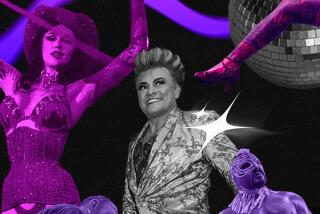THE 1978 PAN AMERICAN GAMES : THE NEW AMERICANS : Cuban Who Defected Says He’d Discourage Others
- Share via
INDIANAPOLIS — It had been a long nine years since Roberto Urrutia last competed in an international weightlifting event, but there he was on the stage of the Circle Theater with a Pan Am medal around his neck, Cuban flags flying overhead alongside the Stars and Stripes and the Cuban national anthem playing.
It was an emotional moment.
The last time he held over his head barbells of more than twice his weight, he was the pride of Cuba, a world champion. Now, his countrymen who share the medal stand with him call him a traitor. His picture is on the “propaganda” that brings international officials to the bargaining table.
Even the journalists who jammed into an intense press conference to hear about his incredible adventure ended up shouting down one another’s questions and arguing heatedly about just what he had said and what he had meant.
If he had it to do over again, if he could put himself back in that hotel room in Mexico City that summer morning in 1980, would he tie the sheets together to make his escape from a fourth-floor window? Would he jump on a bus, then sneak through the streets, imagining the Cuban secret police trailing him, and climb over the wall of the American Embassy to defect?
Cuban reporters were there when Urrutia was asked if he had, or if he would, tell other Cuban athletes that they should defect. He said: “If anybody wanted to do anything like defect, I would tell them, ‘Please don’t do it. It is a very big thing to do, and it is difficult.’ ”
He said that he had tried to explain to his former coach, Ramon Madrigal, and other officials of the Cuban delegation, why he had gone over the wall that night. He was young and he was confused. He was upset about his training.
“It was not because of politics,” Urrutia said.
Whatever his motive then, he’s in the political arena now. He might be a pawn, but the game is raging around him.
After so many years as one of Cuba’s most celebrated athletes, he now has competed against Cuba. He has competed for the United States. And the politics of that move had the little theater in downtown Indianapolis packed for a middleweight weightlifting session on a Tuesday afternoon.
Lifters from Venezuela and Uruguay were ignored as the partisan crowd waited to see how Urrutia would do against the Cubans, how Urrutia would be received, whether there would be an incident, even though there were about one police officer or security guard for every five or six fans.
There were no confrontations.
Urrutia finished right behind the Cubans. Pablo Lara of Cuba won the gold medals in both the clean and jerk, lifting 180 kilograms or 396 3/4 pounds, and the snatch, hefting 145 or 319 1/2, for the overall gold. Francisco Allegues of Cuba won the silver right down the line. And Urrutia won all three bronze medals for the United States.
So there was one American flag up there with two Cuban flags, but the gold medalist gets the anthem.
“When I hear the national anthem of Cuba, of course I feel like a Cuban,” Urrutia said. “It was emotional. I felt it. But I can’t be both.”
Urrutia tried one “no comment” when asked if he had any regrets about defecting, but that was shouted down. He then answered the questions in at least 10 forms, in both Spanish and English, and with enough twists to keep everyone thoroughly confused.
After saying that he wouldn’t recommend defecting, he said that as soon as he reached American soil he felt free. “No security. I felt free like a bird,” he said.
But he also said that the picture that is painted of America is not what he found when authorities drove him across the border and dropped him off in Laredo, Tex.
He made his way to Miami, hoping to find a home with the crowds of Cuban refugees. But an abandoned car became his home, and he couldn’t find a job.
“When people come from the United States to Havana, they say, ‘We got jeans, we got this, we got that, we got the world,’ ” he said. “When you come here and try to look for a job in Miami, no one wants to help.”
Through a church group, he was put in touch with Rafael Guerrero, who has a weightlifting gym in Miami. Guerrero, who was at one time a weightlifting official in Cuba, defected in 1968.
Urrutia eventually worked as a bouncer in a disco, where he met his new wife, Laura; as a clerk in a convenience store, where he was robbed at gunpoint; as a stock boy in a supermarket, where he lifted crates of frozen orange juice, and now works as a truck driver for the same supermarket chain.
In Cuba, his job was weightlifting. Here, he has had to scratch out a living.
Harvey Newton, executive director of U.S. Weightlifting, said that the organization couldn’t do much to help him until he obtained citizenship.
He did that in 1986 in a mass naturalization ceremony at the Orange Bowl over the Fourth of July weekend.
He has been training seriously again for the last five months but is a long way from his peak performances of nine years ago.
The Cuban weightlifters wrapped up the top two medals in the clean and jerk on their first lifts, then used the rest of their attempts to try to break the Pan Am record of 190 kilograms that Urrutia set in 1979.
Beating the “traitor” was the first goal. Taking his record would have been the ultimate victory.
Lara, who is 19, said that he remembered Urrutia as a champion, but added: “By the time I started lifting heavily, Urrutia had already deserted our country. . . . I feel that he’s a traitor to our country and winning against him was a great thing.”
Allegues said: “We had talked about him and knew that he was returning to training. Considering the length of time that he has been without training and away from the sport, we were impressed with the way he lifted today.
“We don’t think anything good about him in our country anymore. He is a traitor.”
Yet, Urrutia said that he was surprised at how friendly the Cuban athletes were to him during the competition.
It seemed to be important to him.
He had nothing negative to say about Cuba. After all, he does have a former wife and a 9-year-old son there. And he says he tries to call his mother but: “It sometimes takes four or five days to make a call. It’s kind of hard to communicate through AT&T.;”
That’s proof, he says, that he is able to keep his sense of humor through anything.
His wife was with him Monday, with their 5-month-old son, and she was quite definitive on whether he is happy.
“I know he’s happy now,” she said. “He’s very happy to be competing again. He left Cuba, but he never left weightlifting. That is in his heart.”
More to Read
Go beyond the scoreboard
Get the latest on L.A.'s teams in the daily Sports Report newsletter.
You may occasionally receive promotional content from the Los Angeles Times.






